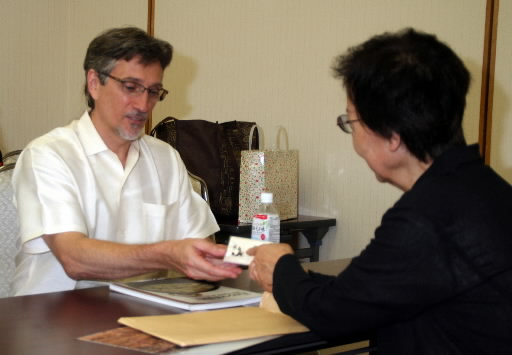Truman grandson meets with A-bomb survivors, accepts seeds of A-bombed tree
Aug. 21, 2012
by Masaki Kadowaki, Staff Writer
On August 5, Clifton Truman Daniel, 55, the grandson of Harry S. Truman, the U.S. president at the time of the atomic bombings, met with two A-bomb survivors, in turn, at Aster Plaza, a cultural center in Naka Ward. Mr. Daniel, a resident of Chicago, is making his first visit to Hiroshima. In 1964, one of the two survivors traveled to the United States and other countries to relate the devastation of the bombings. Mr. Daniel was given seeds from an A-bombed aogiri, or Chinese parasol tree, and promised that he would plant the seeds on the grounds of the Harry S. Truman Library and Museum, located in the U.S. state of Missouri.
The two survivors are Emiko Okada, 75, a resident of Higashi Ward, and Hiromu Morishita, 81, a resident of Saeki Ward. Mr. Morishita was part of the delegation of the 1964 World Peace Pilgrimage, which saw 40 people, including survivors of Hiroshima and Nagasaki and academics, visit eight countries, among them the United States and the former Soviet Union.
“Let’s not be held captive by the past,” Ms. Okada said. “Let’s work together for the future.” She explained the significance of the peace pilgrimage and shared her A-bomb experience before handing him the seeds from the A-bombed aogiri tree which stands in Hiroshima Peace Memorial Park. After solemnly listening to her account, Mr. Daniel promised to plant the seeds on the premises of his grandfather’s presidential library, adding his hope that American war veterans and A-bomb survivors will one day have the opportunity to speak together.
Mr. Morishita, the former chairman of the World Friendship Center (WFC), an NPO based in Nishi Ward, and several others took a different route than that of other delegates during the pilgrimage, and was able to meet Mr. Truman in person in Missouri, where the former president was living at the time.
Mr. Morishita told Mr. Daniel, “Mr. Truman said that the atomic bombings were carried out to minimize the loss of human life from the war, but he didn’t apologize. Some of the participants were satisfied that they had the chance to meet him face to face, but I wanted him to say that he was sorry.” Mr. Daniel quietly listened as Mr. Morishita spoke.
(Originally published on August 6, 2012)
On August 5, Clifton Truman Daniel, 55, the grandson of Harry S. Truman, the U.S. president at the time of the atomic bombings, met with two A-bomb survivors, in turn, at Aster Plaza, a cultural center in Naka Ward. Mr. Daniel, a resident of Chicago, is making his first visit to Hiroshima. In 1964, one of the two survivors traveled to the United States and other countries to relate the devastation of the bombings. Mr. Daniel was given seeds from an A-bombed aogiri, or Chinese parasol tree, and promised that he would plant the seeds on the grounds of the Harry S. Truman Library and Museum, located in the U.S. state of Missouri.
The two survivors are Emiko Okada, 75, a resident of Higashi Ward, and Hiromu Morishita, 81, a resident of Saeki Ward. Mr. Morishita was part of the delegation of the 1964 World Peace Pilgrimage, which saw 40 people, including survivors of Hiroshima and Nagasaki and academics, visit eight countries, among them the United States and the former Soviet Union.
“Let’s not be held captive by the past,” Ms. Okada said. “Let’s work together for the future.” She explained the significance of the peace pilgrimage and shared her A-bomb experience before handing him the seeds from the A-bombed aogiri tree which stands in Hiroshima Peace Memorial Park. After solemnly listening to her account, Mr. Daniel promised to plant the seeds on the premises of his grandfather’s presidential library, adding his hope that American war veterans and A-bomb survivors will one day have the opportunity to speak together.
Mr. Morishita, the former chairman of the World Friendship Center (WFC), an NPO based in Nishi Ward, and several others took a different route than that of other delegates during the pilgrimage, and was able to meet Mr. Truman in person in Missouri, where the former president was living at the time.
Mr. Morishita told Mr. Daniel, “Mr. Truman said that the atomic bombings were carried out to minimize the loss of human life from the war, but he didn’t apologize. Some of the participants were satisfied that they had the chance to meet him face to face, but I wanted him to say that he was sorry.” Mr. Daniel quietly listened as Mr. Morishita spoke.
(Originally published on August 6, 2012)








